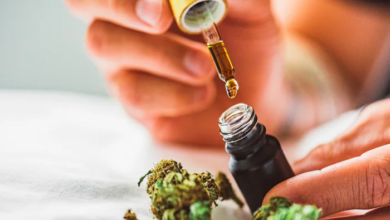CBD Oil: What It Is, How It Works, and What You Need to Know

In this article, we will explore what CBD oil is, how it works, what are its possible benefits and risks, how to use it safely and effectively, and what you need to know before buying or using it.
What is CBD oil and how is it made?
CBD oil is a liquid extract that contains CBD and other cannabinoids, terpenes, flavonoids, and other compounds from the cannabis plant. The oil is usually diluted with a carrier oil, such as hemp seed oil, coconut oil, or olive oil, to improve its absorption and flavor.
There are different methods of extracting CBD oil from the cannabis plant, such as CO2 extraction, ethanol extraction, or olive oil extraction. Each method has its advantages and disadvantages in terms of purity, potency, and cost. The quality and safety of CBD oil depend largely on the source of the cannabis plant, the extraction method, and the testing procedures.
How does CBD oil work in the body?
CBD oil works by interacting with the endocannabinoid system (ECS), a complex system that regulates various physiological and cognitive processes in the body. The ECS consists of two types of receptors: CB1 and CB2. CB1 receptors are mainly found in the brain and nervous system, while CB2 receptors are mainly found in the immune system and peripheral tissues.
The ECS produces its own cannabinoids, called endocannabinoids, that bind to these receptors and modulate their activity. CBD does not directly bind to either CB1 or CB2 receptors but may influence their signaling by enhancing or inhibiting the effects of endocannabinoids or other cannabinoids.
By influencing the ECS, CBD may affect various functions in the body, such as pain perception, inflammation, mood, memory, appetite, sleep, immune response, and more.
What are the potential benefits of CBD oil?
CBD oil has been studied for its potential therapeutic effects on various conditions and symptoms. Some of the most common uses of CBD oil are:
- Pain relief: CBD may help reduce chronic pain by affecting the ECS and other pain pathways. Several studies have shown that CBD may be effective for neuropathic pain, inflammatory pain, cancer pain, fibromyalgia, and migraine.
- Anxiety and depression: CBD may have anti-anxiety and antidepressant properties by modulating serotonin receptors and other neurotransmitters involved in mood regulation. Several studies have shown that CBD may be effective for generalized anxiety disorder, social anxiety disorder, panic disorder, post-traumatic stress disorder, obsessive-compulsive disorder, and depression.
- Epilepsy: CBD may have anticonvulsant effects by affecting ion channels and other mechanisms involved in seizure activity. The FDA has approved a purified form of CBD oil called Epidiolex for treating two rare forms of epilepsy: Dravet syndrome and Lennox-Gastaut syndrome. Several studies have also shown that CBD may be effective for other types of epilepsy.
- Neurodegenerative diseases: CBD may have neuroprotective effects by reducing oxidative stress, inflammation, and neurotoxicity in the brain. Several studies have shown that CBD may be effective for Alzheimer’s disease, Parkinson’s disease, multiple sclerosis, Huntington’s disease, and amyotrophic lateral sclerosis.
- Cancer: CBD may have anticancer effects by inducing apoptosis (cell death), inhibiting angiogenesis (blood vessel formation), and modulating immune system responses. Several studies have shown that CBD may be effective for reducing tumor growth, enhancing the efficacy of chemotherapy, and alleviating cancer-related symptoms such as pain, nausea, vomiting, and cachexia (wasting syndrome).
What are the possible risks and side effects of CBD oil?
CBD oil is generally considered safe and well-tolerated by most people. However, some people may experience some mild to moderate side effects such as:
- Drowsiness
- Dry mouth
- Diarrhea
- Reduced appetite
- Changes in weight
- Changes in blood pressure
- Changes in liver enzymes
These side effects are usually dose-dependent and may vary depending on the individual’s sensitivity to CBD. To minimize these side effects, it is advisable to start with a low dose of CBD oil and gradually increase it until the desired effects are achieved.
CBD oil may also interact with some medications, such as anticoagulants, anticonvulsants, antidepressants, and opioids. CBD may either enhance or inhibit the effects of these medications by affecting their metabolism or clearance. To avoid potential drug interactions, it is advisable to consult with a doctor before using CBD oil if you are taking any prescription or over-the-counter medications.
CBD oil may also have some contraindications, such as pregnancy, breastfeeding, liver disease, or allergy to cannabis or hemp. CBD may cross the placenta and affect the development of the fetus. CBD may also pass into breast milk and affect the nursing infant. CBD may also worsen liver function or cause allergic reactions in some people. To avoid these risks, it is advisable to consult with a doctor before using CBD oil if you have any of these conditions or concerns.
How to use CBD oil safely and effectively?
CBD oil can be taken in various ways, such as sublingually (under the tongue), orally (by mouth), topically (on the skin), or inhalation (by vaping or smoking). Each method has its advantages and disadvantages in terms of onset, duration, bioavailability, and convenience.
The optimal dose of CBD oil depends on several factors, such as the individual’s weight, metabolism, genetics, health condition, and desired effects. There is no universal dose of CBD oil that works for everyone. Therefore, it is recommended to start with a low dose of CBD oil and adjust it according to the individual’s response and tolerance.
A general guideline for finding the optimal dose of CBD oil is to start with 1–6 mg of CBD per 10 pounds of body weight and increase it by 5 mg every week until the desired effects are achieved. For example, a person who weighs 150 pounds may start with 15–90 mg of CBD per day and increase it by 25 mg every week until they find their optimal dose.
It is important to keep track of the dose, method, time, and effects of CBD oil to monitor its efficacy and safety. It is also important to buy CBD oil from reputable sources that provide third-party lab testing results and certificates of analysis to ensure the quality and purity of the product.
Conclusion
CBD oil is a natural product that may offer various health benefits for various conditions and symptoms. CBD oil works by interacting with the endocannabinoid system and other systems in the body. CBD oil may help reduce pain, anxiety, depression, epilepsy, neurodegenerative diseases, cancer, and more. However, CBD oil may also have some side effects and interactions with some medications. Therefore, it is important to use CBD oil safely and effectively by consulting with a doctor, starting with a low dose, buying from reputable sources, and keeping track of the results.




